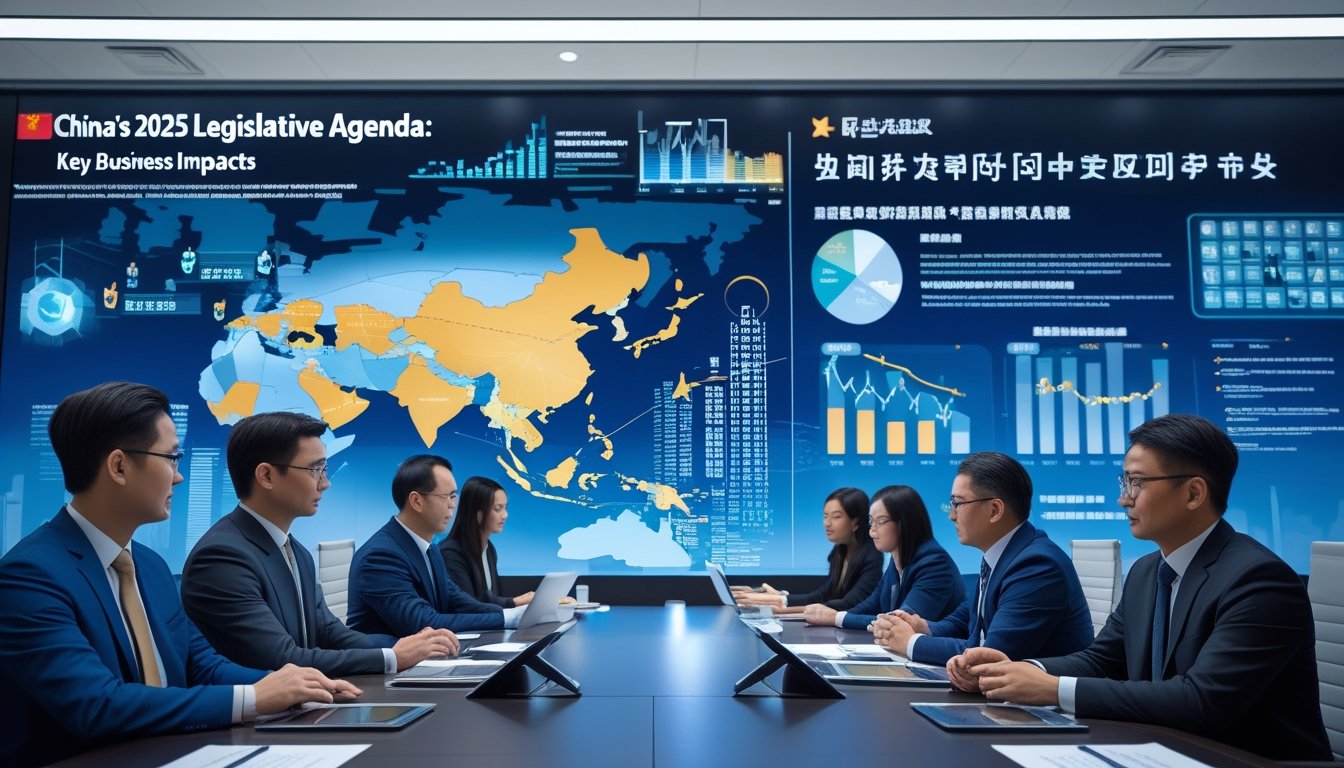Studying China's export control regulations can be a challenge for businesses engaged in international trade. As the global economic landscape shifts and adapts, keeping abreast of the latest legislative updates is crucial for compliance and commercial success. At China Legal Experts, we understand the complexities this evolving framework poses and are committed to providing clear, concise insights.
In this blog, we will explore China's newest export control measures, breaking down the most recent regulations that could significantly impact your business operations. Remember, understanding these rules is not just about legal compliance—it's about maintaining a competitive edge in today's fast-paced market.
Stay ahead of the curve as we guide you through the critical aspects of China's export controls, ensuring you have the knowledge to maneuver through regulatory hurdles with confidence.
Overview of China's Export Control System
China has established a robust export control system that involves multiple departments of the State Council and the Central Military Commission (CMC). The regulatory system provides a solid institutional guarantee for the control of dual-use items. In this section, we will give an overview of China's export control system, including the Export Control Law and Foreign Trade Law.
Export Control Law
The Export Control Law is a comprehensive framework that addresses many dimensions of export controls. It was promulgated in October 2020 and became effective on December 1, 2020. The law includes clear provisions on systems, measures, and international cooperation on export controls. It also sets a basic institutional framework and unified rules for export control policies, a control list, temporary controls, a restricted name list, and supervision.
The Ministry of Commerce and the General Administration of Customs enforce the Export Control Law. It applies to the export of dual-use items, military items, nuclear items, and other goods, technologies, and services related to national security and interests. The law requires exporters to obtain export licenses and comply with relevant regulations. It also imposes penalties for violations, such as fines, confiscation of illegal gains, and restrictions on export activities.
Foreign Trade Law
The Foreign Trade Law is another important law that regulates China's foreign trade activities. It was promulgated in 2004 and revised in 2018. The law aims to promote foreign trade, protect the legitimate rights and interests of foreign trade operators, and maintain fair competition. It covers various aspects of foreign trade, such as import and export procedures, trade contracts, trade remedies, and trade promotion.
The Ministry of Commerce and other relevant departments enforce the Foreign Trade Law. It applies to all foreign trade activities conducted by Chinese enterprises and individuals. The law requires foreign trade operators to comply with relevant laws and regulations, fulfill contractual obligations, and protect intellectual property rights. It also provides legal remedies for disputes and violations.
Key Technologies Under Scrutiny

China's export control regime has been undergoing significant changes in recent years, with a focus on restricting the export of key technologies that are deemed critical to national security and economic development. In this section, we will examine some of the key technologies that are currently under scrutiny in China's export control regime.
Artificial Intelligence
Artificial Intelligence (AI) is one of the key areas where China is seeking to become a global leader. However, the Chinese government is also concerned about the potential risks posed by the export of AI technologies, particularly in the areas of military and security applications. As a result, China has been tightening its export control regime for AI technologies, with a focus on preventing the export of technologies that could be used for military purposes.
Semiconductor Production
Semiconductor production is another area where China is seeking to become a global leader. However, the Chinese government is also concerned about the potential risks posed by the export of semiconductor production technologies, particularly in the areas of military and security applications. As a result, China has been tightening its export control regime for semiconductor production technologies, with a focus on preventing the export of technologies that could be used for military purposes.
Advanced Computing
Advanced computing technologies, including quantum computing, are also under scrutiny in China's export control regime. China is seeking to become a global leader in these areas, but the Chinese government is also concerned about the potential risks posed by the export of these technologies, particularly in the areas of military and security applications. As a result, China has been tightening its export control regime for advanced computing technologies, with a focus on preventing the export of technologies that could be used for military purposes.
Implications for National and International Security
Military Applications
The export controls on China's AI and semiconductor sectors have direct implications for national and international security. China's military has been investing heavily in AI technologies, and any advancements in these areas could give them a significant advantage in future conflicts. With China's focus on military modernization, the United States and other countries have expressed concerns about the potential military applications of Chinese technology.
Surveillance Capabilities
China's surveillance capabilities have been a growing concern for human rights organizations and governments around the world. The export controls on China's AI and semiconductor sectors could help prevent the development of technologies that could be used for mass surveillance. The Chinese government has been using AI and other technologies to monitor its citizens, and there are fears that these technologies could be used to suppress dissent and violate human rights.
Human Rights Considerations
The export controls on China's AI and semiconductor sectors also have important human rights implications. The Chinese government has been accused of using technology to monitor and control its citizens, particularly in the Xinjiang region. The use of facial recognition technology, for example, has been used to track and detain Uighur Muslims. By limiting the export of these technologies, the United States and other countries could help prevent the Chinese government from further violating human rights.
China's Export Controls in Global Context
China's export controls have become a topic of global interest. With the Biden administration seeking to strengthen U.S.-China trade relations, China's export controls have become a point of contention between the two countries.
U.S.-China Trade Relations
The Biden administration has been trying to improve U.S.-China trade relations. However, China's export controls have made it difficult for the U.S. to do so. The U.S. has accused Beijing of using export controls to gain an unfair advantage in trade. The U.S. has also accused Chinese companies of stealing U.S. technology.
International Agreements and Arrangements
China is a member of the Wassenaar Arrangement, an international agreement that regulates the export of dual-use technologies. The Wassenaar Arrangement was established in 1996 and has 42 member countries, including the U.S., Russia, and the Netherlands. The arrangement aims to prevent the proliferation of weapons of mass destruction.
China's export controls have also been a point of contention with Taiwan. China has tried to prevent Taiwanese companies from exporting sensitive technologies to other countries. The U.S. has also been concerned about China's export controls in relation to Taiwan.
In addition, the Chips Act, which was signed into law by President Joe Biden, aims to strengthen U.S. export controls on semiconductor technology. The Chips Act is seen as a response to China's efforts to become more self-sufficient in semiconductor technology.
Compliance and Enforcement
When it comes to China's export controls, compliance and enforcement play a crucial role. To ensure compliance, you need to be aware of the regulations and laws that apply to your business. You must also have a strategy in place to manage your compliance risks.
Bureau of Industry and Security (BIS)
The Bureau of Industry and Security (BIS) is a key agency responsible for enforcing export control regulations in the United States. They are responsible for administering and enforcing the Export Administration Regulations (EAR). The EAR controls the export and re-export of certain goods, software, and technology.
Entity List and Licensing Requirements
The Entity List is a list of entities that have been identified as posing a significant risk to national security or foreign policy interests of the United States. If your business is dealing with an entity on the Entity List, you may need a license to export certain items to them. You must also ensure that you are not exporting any items that are prohibited by the EAR.
Corporate Compliance Strategies
To ensure compliance with China's export controls, it is essential to have a corporate compliance strategy. This strategy should include regular training sessions for employees on the regulations and laws that apply to your business. You should also have a system in place to manage your compliance risks, such as a compliance management system (CMS).
Conclusion
Grasping the full scope of China's export control regulations is essential for companies aiming to conduct business with a high degree of diligence and insight. These regulations are not only about compliance but also about protecting your business interests and securing your position in the international market. With the Chinese government increasingly refining its approach, staying informed and responsive to these changes is more critical than ever.
For further insights and assistance with the multifaceted challenges of conducting business in China, including company registration and overcoming common hurdles, we invite you to continue your journey with us. Visit our dedicated blog on Common Problems in China Company Registration to ensure your business foundation is as robust as your ambitions. At China Legal Experts, your compliance and success are our priority.
Frequently Asked Questions
Does China have export controls?
Yes, China has export controls in place to regulate the export of certain items that are deemed sensitive or strategic. These controls are aimed at protecting national security, maintaining social stability, and promoting economic development. China's export control regime is administered by several government agencies, including the Ministry of Commerce, the General Administration of Customs, and the State Administration of Science, Technology, and Industry for National Defense.
How much trade does China control?
China is the world's largest exporter, and its exports account for a significant share of the global trade. According to the World Trade Organization, China's merchandise exports amounted to $2.5 trillion in 2020, which represents about 13% of the world's total merchandise exports.
What are examples of export controls?
Examples of items that are subject to export controls in China include military and dual-use goods, nuclear materials and technology, certain chemicals and biological agents, and cultural relics. The Chinese government also maintains a list of entities that are subject to sanctions and export restrictions.
How do export controls work?
Export controls are a set of regulations that restrict the export of certain goods, technologies, and services to specific countries or entities for reasons of national security, foreign policy, or other strategic reasons. These controls are usually implemented through licensing requirements, end-use restrictions, and other measures that are designed to prevent the transfer of sensitive technologies and materials to unauthorized recipients.
What is export control compliance?
Export control compliance refers to the process of ensuring that a company or individual complies with the relevant export control regulations when exporting goods, technologies, or services. This includes obtaining the necessary licenses and authorizations, conducting due diligence on customers and end-users, and implementing appropriate record-keeping and reporting procedures.
How do I know if something is export controlled?
Determining whether an item is subject to export controls can be a complex process. It requires knowledge of the relevant regulations and the specific characteristics of the item in question. In general, items that are designed for military or dual-use applications, contain sensitive technologies or information, or are intended for use in countries or entities subject to sanctions or restrictions are likely to be subject to export controls. It is important to consult with legal and regulatory experts to ensure compliance with the relevant export control regulations.
Subscribe to receive updates
Subscribe to receive the latest blog posts to your inbox every week.






